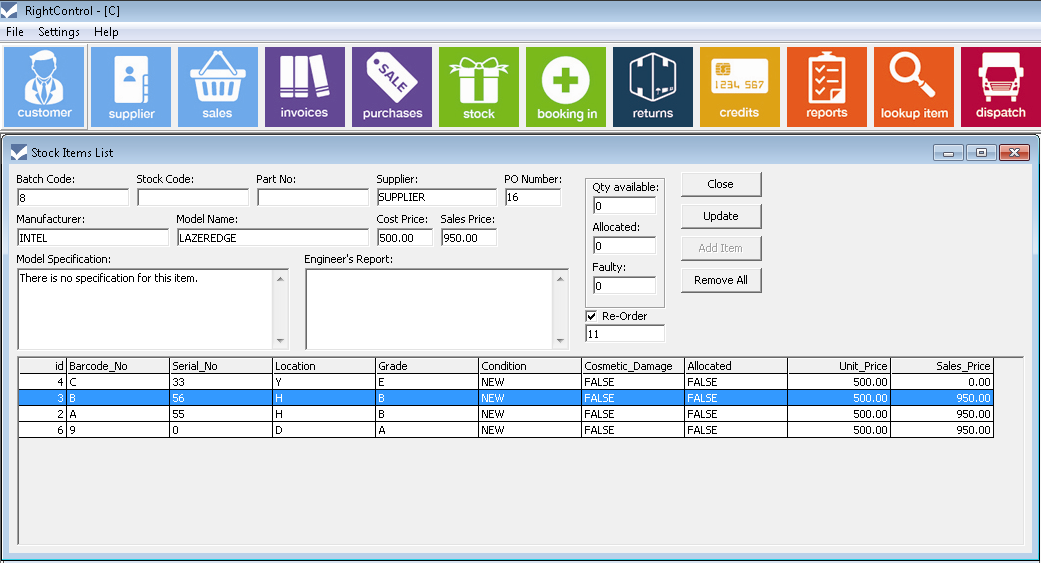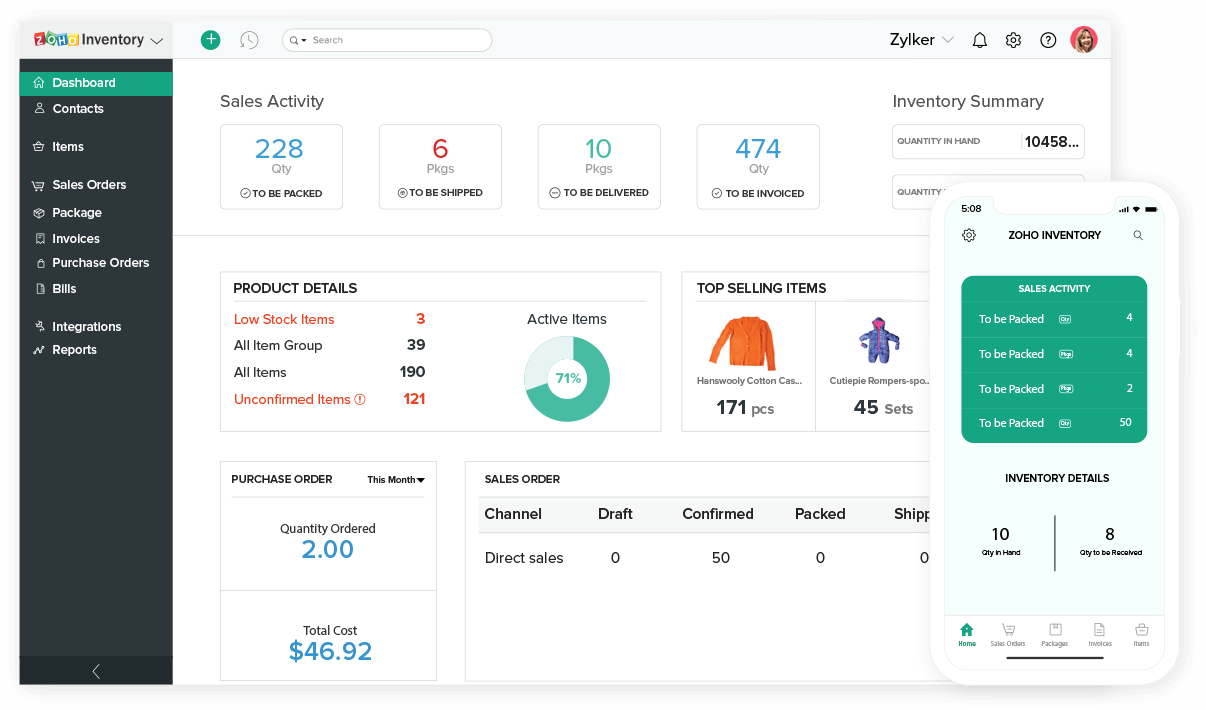Inventory management software small business, this guide delves into the significance of inventory management for small businesses, exploring the challenges they face and how this software can help them streamline operations, reduce costs, and increase profitability.
As a small business owner, managing inventory can be a daunting task. With limited resources and time, it’s crucial to have a system in place that helps you keep track of your stock, optimize your ordering process, and minimize losses.
Introduction to Inventory Management Software for Small Businesses

Inventory management is crucial for small businesses, as it enables them to track and control their stock levels, ensuring they have the right products in the right quantities to meet customer demand.
Small businesses often face challenges in managing inventory effectively due to limited resources, lack of specialized knowledge, and manual processes. These challenges can lead to stockouts, overstocking, and inaccurate inventory records, resulting in lost sales, increased costs, and inefficient operations.
Role of Inventory Management Software
Inventory management software addresses these challenges by automating and streamlining inventory processes, providing real-time visibility into stock levels, and facilitating efficient order fulfillment.
By utilizing inventory management software, small businesses can improve inventory accuracy, optimize stock levels, reduce costs, and enhance customer satisfaction.
Key Features of Inventory Management Software for Small Businesses

Inventory management software is essential for small businesses to streamline their inventory processes, reduce costs, and improve customer satisfaction. Here are some of the key features of inventory management software for small businesses:
Centralized Inventory Management
Centralized inventory management allows businesses to track their inventory levels across multiple locations in real-time. This provides a comprehensive view of inventory, making it easier to manage stock levels, prevent shortages, and optimize inventory allocation.
Automated Inventory Tracking, Inventory management software small business
Inventory management software automates inventory tracking, eliminating the need for manual data entry and reducing the risk of errors. The software automatically updates inventory levels based on sales, purchases, and other transactions, providing businesses with accurate and up-to-date inventory information.
Inventory Forecasting
Inventory forecasting helps businesses predict future demand based on historical data and current trends. This information can be used to optimize inventory levels, avoid overstocking or understocking, and improve customer satisfaction by ensuring that products are always in stock when customers need them.
Purchase Order Management
Purchase order management allows businesses to create, track, and manage purchase orders. The software automates the purchase order process, making it easier to manage vendor relationships, track orders, and ensure that goods are received on time and in good condition.
Reporting and Analytics
Inventory management software provides robust reporting and analytics capabilities. Businesses can use these reports to track inventory performance, identify trends, and make informed decisions about inventory management.
Integration with Other Systems
Inventory management software can integrate with other business systems, such as accounting software, e-commerce platforms, and shipping carriers. This integration streamlines inventory management processes, reduces manual data entry, and improves overall business efficiency.
Benefits of Using Inventory Management Software for Small Businesses
Inventory management software offers significant advantages to small businesses, streamlining operations, reducing costs, and boosting profitability.
Streamlined Operations
Inventory management software automates tasks such as tracking stock levels, managing orders, and generating reports. This reduces manual labor, improves accuracy, and frees up staff for other essential tasks.
Reduced Costs
By optimizing inventory levels, businesses can minimize overstocking and reduce storage costs. Software also helps identify slow-moving items, allowing businesses to adjust purchasing strategies and avoid losses.
Increased Profitability
Accurate inventory tracking enables businesses to fulfill customer orders promptly, reducing lost sales and increasing customer satisfaction. Optimized inventory levels also help avoid markdowns and improve cash flow.
Quantifiable Benefits
* A study by the Aberdeen Group found that businesses using inventory management software experienced a 43% reduction in inventory carrying costs.
- A survey by Gartner revealed that businesses using inventory management software increased their sales by an average of 10%.
- A case study by SAP showed that a small business using its inventory management software reduced its inventory holding costs by 25%.
Choosing the Right Inventory Management Software for Your Small Business

Selecting the appropriate inventory management software for your small business is crucial to streamline operations and optimize inventory levels. Consider the following factors:
Business size and complexity
Determine the number of products, SKUs, and warehouses you manage. Choose software that can handle your current and future inventory needs.
Industry-specific requirements
Consider software tailored to your industry’s unique inventory management challenges. For example, food and beverage businesses may require specialized software for perishable goods.
Integration with other systems
Ensure the software integrates seamlessly with your existing accounting, POS, and ERP systems to avoid data duplication and streamline processes.
Scalability
Choose software that can grow with your business as you expand your product line or operations.
Support and training
Evaluate the software provider’s support options and training resources to ensure you have access to assistance when needed.
Types of Inventory Management Software
Various types of inventory management software are available, each with its own strengths:
Cloud-based software
Accessed via the internet, offering flexibility, scalability, and real-time inventory visibility.
On-premise software
Installed on your own servers, providing greater control and customization options.
Open-source software
Free to use and modify, but may require technical expertise for implementation and support.
Specialized software
Designed for specific industries or business needs, offering tailored features and functionality.
Best Practices for Implementing Inventory Management Software in Small Businesses
Implementing inventory management software effectively in small businesses requires careful planning and execution. Here are some best practices to follow:
Data Accuracy
Maintaining accurate inventory data is crucial for effective inventory management. Ensure regular audits and reconciliations to identify and correct any discrepancies. Implement data validation checks to minimize errors during data entry.
User Training
Provide comprehensive training to all users of the inventory management software. This will ensure they understand how to use the system efficiently and accurately. Consider creating user guides and conducting regular training sessions.
Ongoing Maintenance
Inventory management software requires ongoing maintenance to ensure its effectiveness. Regularly update the software to the latest version to benefit from new features and bug fixes. Monitor system performance and address any issues promptly.
Case Studies of Successful Implementations of Inventory Management Software in Small Businesses
In this section, we will explore real-life examples of small businesses that have successfully implemented inventory management software. We will examine the challenges they faced, the benefits they achieved, and gather insights from their testimonials and success stories.
Challenges Faced by Small Businesses
- Manual inventory tracking leading to errors and inaccuracies.
- Inefficient stock management resulting in overstocking or stockouts.
- Difficulty in forecasting demand and optimizing inventory levels.
- Limited visibility into inventory levels across multiple locations.
- Time-consuming inventory audits and reconciliation processes.
Benefits Achieved by Implementing Inventory Management Software
- Improved inventory accuracy and reduced errors.
- Optimized stock levels, minimizing overstocking and stockouts.
- Enhanced demand forecasting and inventory planning.
- Increased visibility and control over inventory across multiple locations.
- Automated inventory audits and reconciliation, saving time and effort.
Testimonial from a Small Business Owner
“Before implementing inventory management software, we struggled to keep track of our stock levels accurately. We often overstocked certain items, while others ran out unexpectedly. Since implementing the software, we have significantly improved our inventory management and reduced our losses due to overstocking and stockouts.”
John, Owner of a retail store
Case Study: ABC Company
ABC Company, a small manufacturing business, faced challenges in managing their inventory across multiple warehouses. They implemented an inventory management software that provided real-time visibility into their inventory levels. This allowed them to optimize their stock levels, reduce overstocking, and improve their overall inventory management efficiency.
Future Trends in Inventory Management Software for Small Businesses
Inventory management software is constantly evolving, with new features and capabilities being added all the time. These advancements are designed to help small businesses streamline their operations, improve efficiency, and reduce costs. In this section, we’ll discuss some of the emerging trends in inventory management software and explore their potential impact on small businesses.
One of the most significant trends is the increasing use of artificial intelligence (AI) and machine learning (ML). These technologies can be used to automate many tasks associated with inventory management, such as forecasting demand, optimizing stock levels, and generating reports.
This can free up small business owners to focus on other aspects of their business, such as marketing and sales.
Integration with Other Business Systems
Another trend is the increasing integration of inventory management software with other business systems, such as accounting software, CRM systems, and e-commerce platforms. This integration can help to improve data accuracy and efficiency, and it can also make it easier for small businesses to manage their inventory across multiple channels.
Cloud-Based Solutions
Cloud-based inventory management software is becoming increasingly popular, as it offers several advantages over on-premises solutions. Cloud-based software is typically more affordable, easier to implement, and more scalable than on-premises solutions. It also allows small businesses to access their inventory data from anywhere, at any time.
How Small Businesses Can Prepare for and Leverage These Advancements
Small businesses can prepare for and leverage these advancements by staying up-to-date on the latest trends in inventory management software. They can also partner with a software vendor that offers a comprehensive solution that meets their specific needs. By investing in the right inventory management software, small businesses can improve their efficiency, reduce costs, and gain a competitive advantage.
Concluding Remarks

By implementing inventory management software, small businesses can gain a competitive edge by improving efficiency, reducing costs, and enhancing customer satisfaction. As technology continues to advance, businesses that embrace these tools will be well-positioned to thrive in the ever-evolving marketplace.
FAQs: Inventory Management Software Small Business
What are the benefits of using inventory management software for small businesses?
Inventory management software can help small businesses streamline operations, reduce costs, increase profitability, improve customer satisfaction, and gain a competitive edge.
What are the key features of inventory management software for small businesses?
Essential features include inventory tracking, purchase order management, sales order management, reporting, and integrations with other business systems.
How do I choose the right inventory management software for my small business?
Consider factors such as the size of your business, the types of products you sell, your budget, and the features you need.